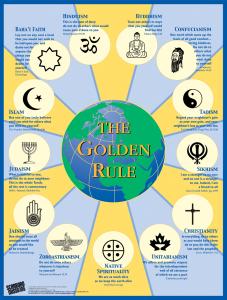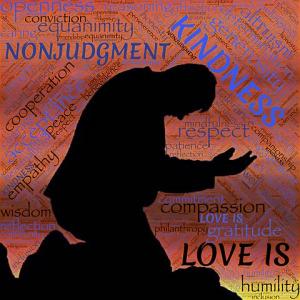 Is the Golden rule not applicable in our daily lives anymore? Is it specific to any one religion for a specific time period towards a specific group? I would argue the golden rule is as relevant to the current environment than any other time, if not more so.
Is the Golden rule not applicable in our daily lives anymore? Is it specific to any one religion for a specific time period towards a specific group? I would argue the golden rule is as relevant to the current environment than any other time, if not more so.
The Golden Rule of conduct was coined in Britain in the seventeenth century. However, many variations have been known in ancient Egypt, India, China and other civilizations as well.
The Declaration Toward a Global Ethic adopted at the Council of Parliament of the World’s Religions in Chicago in 1993 emphasized the interconnection between religion and peace, and further offered principles of global ethic necessary to make it all possible. They included:
- Every human must be treated humanely
- The Golden Rule: do unto others what you wish for yourself.
- Commitment to a culture of non-violence and respect for life
- Culture of tolerance: Life of honesty/truthfulness
- Culture of Equal rights and partnership between men and women
Christian version
Though not called golden rule in the Gospels, the following passages represent what later has come to be known as the golden rule.
In everything, therefore, treat people the same way you want them to treat you, for this is the Law and the Prophets. Matthew 7:12
Do to others as you would like them to do to you. Luke 6-31
In fact, ‘love thy neighbor’ is second only in importance after loving God Almighty. In other words, a true Christian who loves God would not hate his neighbor.
And he said to him, “You shall love the Lord your God with all your heart and with all your soul and with all your mind. This is the great and first commandment. And a second is like it: You shall love your neighbor as yourself. Matthews 22: 37-39
Jewish version
Jesus had actually quoted the Old Testament to refer to the golden rule.
Love your neighbor as yourself. I am the Lord. Leviticus 19:18
The famous Jewish sage, Hillel, was asked to summarize the Torah while he stood on one foot. His response was straightforward:
That which is harmful to you, do not do to your fellow. This is the whole Torah. The rest is the explanation (commentary). Go and learn. Hillel: Talmud, Shabbat 31a
Torah’s views on Immigrants
The following passage can be seen as one application of the golden rule.
Do not take advantage of foreigners who live among you in your land. Treat them like native-born Israelites, and love them as you love yourself. Remember that you were once foreigners living in the land of Egypt. I am the Lord your God. Leviticus 19:33-34
 The “negative” forms of Golden Rule
The “negative” forms of Golden Rule
These versions exists in the eastern religions and call for not doing to others what you don’t like others to do onto you.
- Confucianism: “Do not do to others what you do not want them to do to you” (Analects15:23)
- Hinduism: “This is the sum of duty: do not do to others what would cause pain if done to you” (Mahabharata 5:1517)
- Buddhism: “Hurt not others in ways that you yourself would find hurtful” (Udanavarga5:18)
Islamic version
 Islam puts a premium in being kind to others. We (mankind) are created in God’s image and are referred to as God’s khalifa, or representatives on earth. The most often-mentioned attributes of God in the Qur’an are Ar Rehmaan (Most Kind) and Ar Raheem (Most Merciful), therefore we must show kindness and mercy to others. The following Hadith(saying of Prophet Muhammad) is widely considered as the Islamic version of the golden rule.
Islam puts a premium in being kind to others. We (mankind) are created in God’s image and are referred to as God’s khalifa, or representatives on earth. The most often-mentioned attributes of God in the Qur’an are Ar Rehmaan (Most Kind) and Ar Raheem (Most Merciful), therefore we must show kindness and mercy to others. The following Hadith(saying of Prophet Muhammad) is widely considered as the Islamic version of the golden rule.
Not one of you truly believes until you wish for your brother (others) what you wish for yourself. Hadith of prophet Muhammad- An-Nawawi’s Forty Hadith 13 (p. 56)
The following narrations combines the “positive” and the “negative” version of the golden rule.
A Bedouin came to the prophet, grabbed the stirrup of his camel and said: O the messenger of God! Teach me something to go to heaven with it. Prophet said: “As you would have people do to you, do to them; and what you dislike to be done to you, don’t do to them. Now let the stirrup go! Kitab al Kafi vol. 2, p. 146
This one is from Nahjul Balaggah (Peak of Eloquence)- a collection of letters, sermons and narrations of Ali, Prophet Muhammad’s son in law, the 4th Caliph and the first Imam, according to the Shia Muslim school of thought.
O’ my child, make yourself the measure (for dealings) between you and others. Thus, you should desire for others what you desire for yourself and hate for others what you hate for yourself. Do not oppress, as you do not like to be oppressed. Do good to others as you would like good to be done to you. Regard bad for yourself whatever you regard bad for others. Accept that (treatment) from others which you would like others to accept from you… Do not say to others what you do not like to be said to you. Nahjul Balaggah Letter 31
Enjoin What’s Good (AMR-BIL-MA’RUF)
Muslims are strongly encouraged to enjoin and promote what’s good. The Qur’an has repeatedly defined what is considered “good”.
And from among you there should be a party who invites to good and enjoin what is right and forbid the wrong, and these it is that shall be successful. 3:104
And serve Allah and do not associate anything with Him and be kind to the parents and to the near of kin and the orphans and the needy and the neighbor of (your) kin and the neighbor who are strangers, and the companion in a journey and the wayfarer and those whom your right hands possess; surely Allah does not love him who is proud, boastful. The Qur’an 4:36
 The kindness and mercy extends to all—humans and nonhumans, as the following Hadith commands the believers. This includes animals, and yes, the planet earth!
The kindness and mercy extends to all—humans and nonhumans, as the following Hadith commands the believers. This includes animals, and yes, the planet earth!
Those who are kind and considerate to Allah’s creatures, Allah bestows His kindness and affection on them. Show kindness to the creatures on the earth so that Allah may be kind to you.
Mitzvot
The equivalent of amr-bil-ma’ruf (enjoin what’s good) in Hebrew might be Ma’asim tovim, meaning “good works and actions.” The Torah and the Gospels frequently give instructions to do good deeds. The Jewish Talmud describes 613 commandments (Mitzvot), derived from the Torah, of which 248 are “positive commandments” (the Dos) and 365 are “negative commandments” (the Don’ts). The golden rule would seem to encompass all of the commandments.
Practical implications in today’s world
The adoption of this simple code of conduct as taught by scriptures can go a long way in healing the strained relationship between people of various faiths (and no faith). Putting the golden rule into action can serve as a strong antidote to the environment created by mistrust, prejudice, hate, fear and the “othering” effect that threatens to divide us.
“Others” can be defined as anyone who is not us- our family, coworkers, neighbors, someone from another nation and different religion, race or ethnicity. If we follow the golden rule of our own faith traditions, it would be safe to assume:
We would be kind to others.
We would speak nicely to others.
We would help others in time of need.
We would welcome guests- to our homes, neighborhood and our country.
We would thank others for the good they do- at work, at home and everywhere else.
We won’t bad mouth and defame others.
We won’t spread hate against others.
We won’t hurt others.
We won’t oppress others.
We won’t steal from others.
We won’t kill others, hurt their children or sexually assault and harass women (and men).
The list can go on and on…
How ready are we to adopt the golden rule in our daily life?












